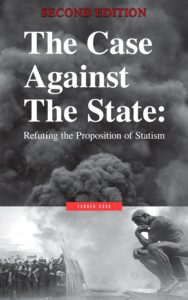It’s often said that the only two certainties in life are death and taxes. However, the latter of these two certainties isn’t viewed with the same dread by all. Surprisingly, many people—referred to as “normies” in this context, seem to willingly and enthusiastically embrace taxation, seeing it as a necessary part of maintaining a functioning society. But why is this the case?
Unpacking the Concept of Taxes (Theft)
To comprehend the varying attitudes towards taxation, it’s crucial to dissect its fundamental principles. The concept of taxation is often equated with government theft, an assertion stemming from the involuntary nature of tax collection. In this view, the government coercively appropriates hard-earned money from its citizens. This perspective sees taxes as an undue imposition on personal liberty and financial freedom, akin to theft.
However, taxation is also seen from a contrasting lens, that of a necessary contribution for communal benefits. Proponents of this perspective argue that taxes are the price citizens pay for a civilized society. They fund vital public goods and services like roads, schools, and healthcare. (Which are mostly privatized and not public.) This interpretation views taxation as a communal duty, a form of social contract that underpins the functioning of a society.
The divergence between these two perspectives—taxation as theft and taxation as societal contribution, shapes individuals’ views on taxes. People’s acceptance or opposition to taxes hinges on which interpretation resonates more with them. The conflict between these perspectives forms a backdrop for further exploration into why some individuals, the normies, seem to willingly accept and even appreciate the role of taxation in society.
Psychological Aspect of Normies’ Acceptance of Taxes
Diving into the cognitive workings of normies’ acceptance of taxes, a notable player is a cognitive bias known as ‘status quo bias’ or ‘conformity bias’. This particular bias reflects a resistance to change and a preference for the familiar, often leading individuals to opt for maintaining current situations over exploring potential changes. Applying this bias to taxation, it’s clear that despite potential disadvantages or systemic flaws within the current tax system, normies tend to favor it.
This bias towards the status quo, even when change might be beneficial, helps explain why some people are less critical of the current tax structure. This acceptance isn’t necessarily grounded in an informed understanding of taxation or a belief that it is fair or efficient, but rather in a psychological tendency to stick with what is familiar.
It’s not so much a love for taxes, but a resistance to the uncertainty that comes with change. The fear of potential chaos or instability that could come from a revamping of the tax system often outweighs any potential benefits, leading to a preference for the devil they know over the devil they don’t.
The Role of Social Conditioning in Accepting Taxes
The power of social conditioning in shaping our beliefs and behaviors cannot be understated, and it significantly influences our views on taxation. The indoctrination often starts early in life, as we’re frequently taught that taxation is a core element of responsible citizenship. The narrative that tax-paying is a fundamental civic obligation is emphasized in various ways, from educational systems to media portrayal. The same educational system that is funded by taxes is the very system that pushes this taxation agenda.
Such continual exposure to the idea of taxes as a societal necessity instills a sense of obligation and normality. These societal narratives and norms have a profound impact on our perceptions, subtly molding our views and attitudes towards taxes. Consequently, taxation isn’t perceived as an imposition but rather a customary and obligatory part of our societal role.
This tends to create a self-perpetuating cycle of acceptance, taxes are accepted because they have “always” been part of our societal structure, and this acceptance is then passed on to future generations. This continual reinforcement of the tax-paying norm significantly contributes to its widespread acceptance among normies.

> Check Current Book Prices <
Examining the Fallacy of “Fair Share” Taxation
“Fair share” taxation is a widely used argument in support of the taxation system. It holds that each individual should bear a fiscal burden that aligns with their income or wealth, ensuring that everyone contributes to public resources proportionally. Nevertheless, this argument is often seen as flawed in the face of real-world practice, where the wealthier strata of society exploit legal gaps to minimize their tax liability.
Despite the criticism and visible disparities in the distribution of tax burdens, a significant number of normies continue to regard taxation as a fair and crucial process. This viewpoint underscores the potent influence of societal norms and ingrained cognitive biases on our perception and understanding of complex systems like taxation. The belief in “fair share” taxation also reinforces the earlier discussed status quo bias, where the inclination towards the known and familiar often overshadows the consideration for change.
It’s also tied into the social conditioning that paints tax-paying as a civic responsibility, which in turn contributes to the acceptance and perpetuation of the current tax system, despite its flaws. It’s noteworthy to mention that acceptance of “fair share” taxation, in many cases, is not a result of an in-depth understanding of the intricacies of tax laws and regulations, but rather a manifestation of the interplay between psychological tendencies, societal norms, and accepted narratives.



Illusion of Government Services in Exchange for Taxes
The idea of receiving government services in return for taxes often serves as a compelling reason for accepting taxation. This concept is deeply ingrained in the minds of normies, fostering the belief that without the mechanism of taxation, critical public services such as education, healthcare, and infrastructure would cease to function effectively. (Even though these sectors have mostly been privatized.)
This perspective allows taxes to be perceived as a necessary exchange, despite the possibility that the value of these services might not equate to the taxes paid. The perception of receiving something in return helps soften the blow of parting with a portion of one’s income. It’s the notion of a tangible return on investment that makes the bitter pill of taxation somewhat easier to swallow.
However, the actual cost of these services and their perceived value might not always align. It’s crucial to question if the public services we receive truly justify the level of taxation, or if this is another manifestation of societal conditioning and cognitive bias. While this belief system eases the acceptance of taxes, it’s essential to dig deeper to comprehend the true cost and benefits ratio, moving beyond the illusion created by the seeming exchange of government services for taxes.
Normies Fear of Arrest Factors the Tax Compliance
The fear of punishment for tax evasion also contributes significantly to normies’ acceptance and compliance with taxation. The possible repercussions of tax evasion, such as heavy fines, imprisonment, or even the societal stigma associated with being labeled a tax evader, act as compelling deterrents. The risk associated with non-compliance tends to outweigh any potential benefits of tax evasion, leading many to comply, albeit reluctantly.
This adherence is not necessarily an endorsement of the tax system but more a response to potential adverse outcomes. Coupled with the aspects of social conditioning and cognitive biases discussed earlier, the fear factor forms a powerful triumvirate that drives many people to not just tolerate taxation but also adhere to it, sometimes even in the face of perceived injustices or inefficiencies within the system.
While fear of punishment is an effective tool for ensuring compliance, it also masks the need for a more comprehensive understanding and engagement with the concept and application of taxation. Thus, it’s important to recognize this dynamic in order to foster more informed discussions about taxation policies and their impact. Is taxation theft by threat of violence?